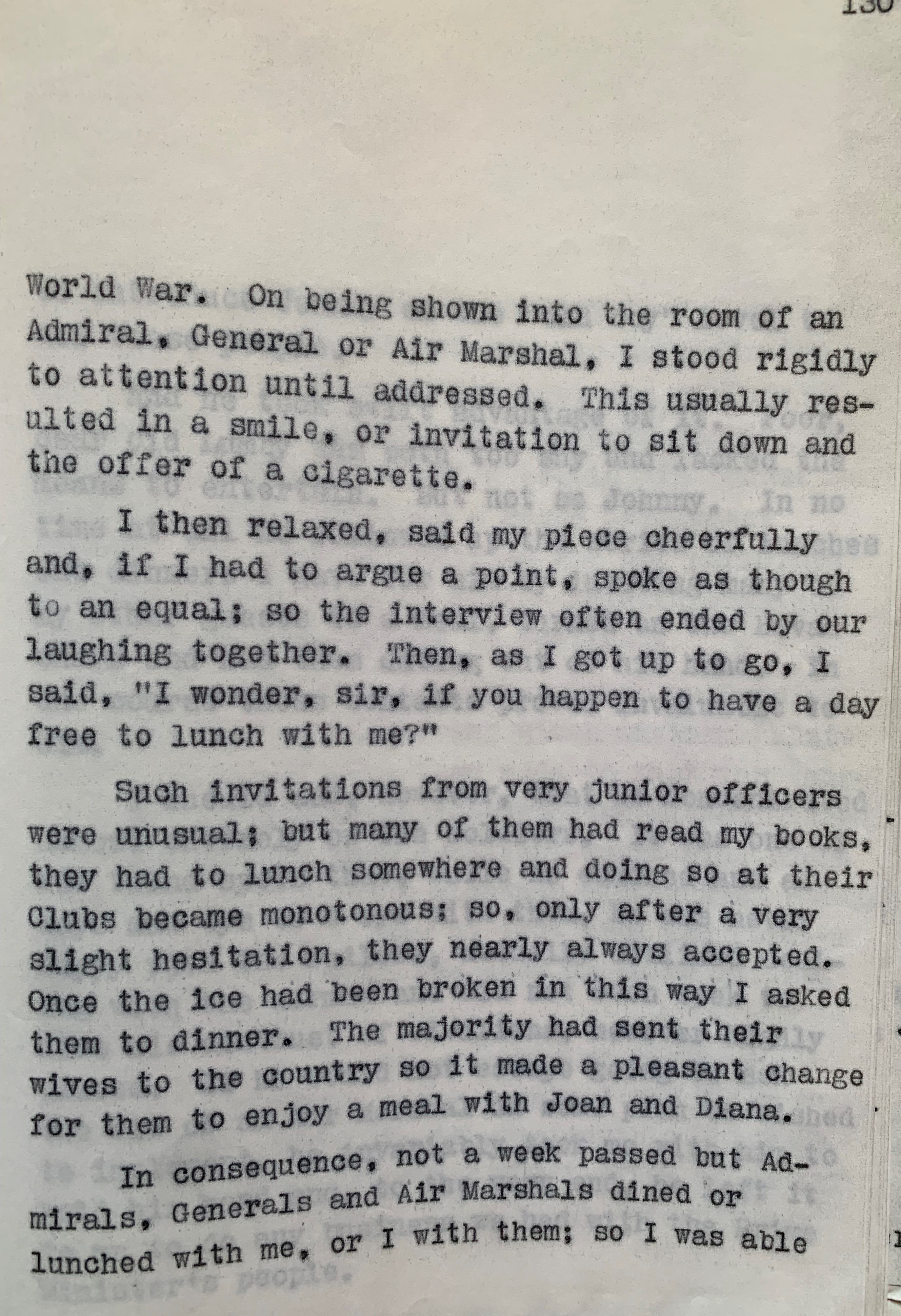
 |
Floor Plan |  |
The Dennis Wheatley 'Museum' - Dennis Wheatley in World War II: a supplement
DW the extrovert networker

DW describes how he introduced himself to senior officers when meeting them for the first time
Click on the image to enlarge
For a transcript, click here
How both DW and Peter Fleming used to `target` senior officers at meetings
Click on the image to enlarge
For a transcript, click here
... and how carefully DW selected his guests when very senior officers first came to dinner
Click on the image to enlarge
For a transcript, click here
A page from U.S. officer Bill Baumer`s Top Secret diary describes a typical war-time lunch hosted by DW
Click on the image to enlarge
For a transcript, click here
... and DW could be helpful ...
for example by papering maps on to
Air Chief Marshall Bill Elliott`s walls
Click on the image to enlarge
For a transcript, click here
As was mentioned in Room 8, DW immediately realised the necessity of networking, and how important it was to his task that senior officers got to know him, and to like him.
Although some of it came naturally, some of it was part of a well-thought out strategy.
It was fortunate for the team that DW was naturally gregarious, and enjoyed entertaining. It was also helpful that he was a best-selling author, and that most of the people he came across had already heard of him. It was also fortunate that DW had prepared for the privations of war well before it was actually declared, by stocking up with large quantities of gourmet food and drink while these were still readily available (in fact, on one occasion, one of Churchill`s aides approached DW, and asked if he could top up the PM`s supply of champagne as it was running low - and DW used his contacts to help out).
In these exhibits, we can see `DW the networker` in operation.
In the first exhibit, DW recounts how he used to behave when he first met senior officers. In the second, he recounts how both he and Peter Fleming both used to `target` - and target of necessity - senior officers. In the third, DW explains how he arranged their first invitation if someone very senior was to join him for dinner (they always discovered that another guest was someone even more senior).
The next exhibit is rather delicious - it is the account in U.S. Intelligence Officer Bill Baumer`s unpublished memoirs of what it was like to have lunch as a guest of Dennis Wheatley.
The final exhibit shows how, if he really liked someone (and DW really liked a great many people), DW would go out of his way to be helpful - in this case papering the walls of his friend Bill Elliott`s walls with maps while he was away at a conference.
Other cases of DW looking after his friends, and of his compassion (for example towards Oliver Stanley when his wife was dying), can be found throughout the other exhibits in this section.
As can be seen in this Museum`s main room on DW`s war, DW kept a list of the people he entertained from July 1941 to October 1944. It extends over seven mostly-typed pages of foolscap, and it shows just how extensive his entertainment was. Over a 173 week period (roughly three years), he entertained on 167 occasions - or roughly once a week. Apart from big New Year parties in 1942 and 1943, to which droves of the `top brass` came, they took place on varied days of the week, with two thirds being dinners and roughly a third lunches, and over the period he entertained a staggering 276 different people - many of whom would have reciprocated the entertainment. Just under two thirds came only once - perhaps when there was some special business in the offing; some 16% came twice, and the remainder more frequently. A list of DW`s fifty most-frequent guests can be seen by clicking here.
| References : | DW`s unpublished memoirs ections of Bill Baumer`s memoirs from DW`s own collections |
| Provenance : | Private Collection |

